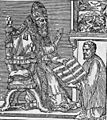Giovanni da Palestrina facts for kids
Giovanni da Palestrina (born around 1525 in Palestrina, Italy – died February 2, 1594 in Rome) was a super important Italian composer. He wrote a lot of church music during the Renaissance period. Most of his music was for choirs, meaning it was choral music.
His music is known for being very polyphonic. This means that different singing parts, like sopranos, altos, tenors, and basses, often sing different words and different melodies all at the same time. Many composers have studied Palestrina's music. It's a great way to learn how to write contrapuntal music, which is music where different melodies fit together.
Early Life and Career
Palestrina got his name from the town where he was born. We don't know his exact birth date. This is because records from his birth were lost when the town burned down in 1577. He probably started singing as a choirboy in Palestrina.
As he grew up, Palestrina got a job. He became the organist and choir director at the Santa Maria Maggiore church in Rome. He didn't earn a lot of money from this job. However, he married a woman from a very wealthy family, so he was quite comfortable.
Working for the Pope
Pope Julius III heard about how talented this young composer was. He invited Palestrina to meet him. Palestrina was then given a very important job. He became the master of the Capella Juliana. This was the choir that sang during services at St Peter’s, Rome.
This was the top music job in Italy, and Palestrina was only 26 years old! Of course, Palestrina composed a special mass to honor the Pope.
Palestrina's Music
Palestrina wrote a lot of music. He composed 93 masses. A mass is a musical setting of the words used in a church communion service. He also wrote motets and madrigals.
Motets are pieces of choral music, usually sacred. Madrigals are also choral pieces, but they are usually secular (not religious). Palestrina and Lassus were two of the most famous composers of the late Renaissance period.
Images for kids
-
Palestrina, presenting his masses to Pope Julius III, 1554
See also
 In Spanish: Giovanni Pierluigi da Palestrina para niños
In Spanish: Giovanni Pierluigi da Palestrina para niños
 | Emma Amos |
 | Edward Mitchell Bannister |
 | Larry D. Alexander |
 | Ernie Barnes |





